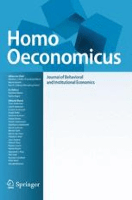
Homo Oeconomicus-Journal of Behavioral and Institutional Economics
Scope & Guideline
Innovating Perspectives on Institutional Economic Frameworks
Introduction
Aims and Scopes
- Behavioral Economics:
The journal places significant emphasis on understanding how psychological factors and cognitive biases affect economic decision-making and behavior. - Institutional Economics:
Research published in this journal often investigates the role of institutions in shaping economic outcomes, including governance structures, legal frameworks, and social norms. - Political Economy:
The intersection of economics and politics is a core focus, with studies examining how political processes and institutions impact economic policies and outcomes. - Philosophical Foundations of Economics:
The journal contributes to the philosophical discourse surrounding economics, exploring the critical rationalism and ethical implications of economic theories. - Voting and Electoral Systems:
A recurring theme in the journal is the analysis of voting mechanisms and electoral systems, particularly how they affect political representation and decision-making.
Trending and Emerging
- Voting Theory Innovations:
There is a marked increase in research exploring new voting systems and their implications for democracy, reflecting a growing interest in how electoral mechanisms can be optimized. - Behavioral Insights into Governance:
A trend towards examining how behavioral economics can inform better governance practices is emerging, suggesting a desire to bridge the gap between theory and public policy. - Critical Rationalism and Economics:
An increasing number of articles are discussing the philosophical underpinnings of economic thought, particularly in relation to critical rationalism, indicating a deeper inquiry into the foundations of economic theories. - Interdisciplinary Approaches to Economic Issues:
The journal is increasingly publishing works that draw from multiple disciplines, such as psychology, sociology, and political science, to provide a more holistic view of economic phenomena. - Public Choice Analysis:
There is a resurgence of interest in public choice theory, particularly in its application to contemporary political issues, highlighting its relevance in understanding the dynamics of political behavior and institutional design.
Declining or Waning
- Traditional Welfare Economics:
There appears to be a waning interest in traditional welfare economics as a standalone subject, with fewer articles explicitly addressing its principles and applications. - Historical Economic Analysis:
Research focusing exclusively on historical economic events or theories has decreased, suggesting a shift towards more contemporary and applied economic issues. - Purely Theoretical Economic Models:
There seems to be a decline in publications centered on abstract theoretical models without empirical application, reflecting a broader trend towards applied economics. - Descriptive Studies of Markets:
Papers that simply describe market behaviors without integrating behavioral or institutional analysis are becoming less frequent, indicating a preference for more analytical approaches.
Similar Journals

POLITICKA EKONOMIE
Advancing Critical Discourse in Social SciencesPOLITICKA EKONOMIE is a prominent academic journal published by VYSOKA SKOLA EKONOMICKA in the Czech Republic, focusing on the intersection of economics, sociology, and political science. Established to foster critical discourse within these fields, the journal's ISSN is 0032-3233, and it operates with an E-ISSN of 2336-8225. With a convergence history dating back to 1980, POLITICKA EKONOMIE has become a valuable resource for researchers and practitioners seeking insights into societal and economic dynamics. Although the journal is categorized in Quartile 4 for both Economics and Econometrics and Sociology and Political Science categories as of 2023, it continues to contribute significantly to empirical research and theoretical advancements. Researchers will find that while the journal is not open access, it welcomes submissions that engage with contemporary issues and debates, thereby promoting academic exchange and innovation in the social sciences.
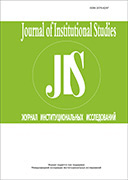
Journal of Institutional Studies
Pioneering innovative perspectives in institutional studies.Journal of Institutional Studies, published by the International Association for Institutional Research, is a premier Open Access journal dedicated to advancing the field of institutional studies. With a commitment to enhancing the accessibility of academic discourse, this journal has been freely available since 2009, thereby promoting the dissemination of knowledge across a global audience. The journal's ISSN is 2076-6297 and it also bears the E-ISSN 2412-6039, ensuring you can find it easily in various academic databases. Despite lacking certain metrics like HIndex and Scopus rankings at present, the Journal of Institutional Studies is pivotal for researchers, professionals, and students interested in exploring the intricate dynamics of institutions in society, policy-making, and governance. By fostering a platform for high-quality research, this journal not only contributes to academic discussions but also influences practice and decision-making within institutions worldwide. We invite you to engage with the valuable insights and research findings presented in this leading journal.

CAMBRIDGE JOURNAL OF ECONOMICS
Elevating Economic Research to New HeightsCambridge Journal of Economics, published by Oxford University Press, is a premier academic journal in the field of economic theory, policy, and applications, catering to researchers, professionals, and students alike. With a rich history dating back to 1977, this journal has established itself as a notable contributor to critical discourse in the arena of Economics and Econometrics. With an impressive Scopus ranking of #210 out of 716 in its category, placing it in the 70th percentile, the journal maintains a solid Q2 classification, reflecting its significant impact and contribution to the field. Although it operates on a subscription basis, the Cambridge Journal of Economics is accessible through a range of academic databases and libraries, ensuring that its high-quality research reaches a wide audience. The journal aims to advance the understanding and application of economic principles, making it an essential resource for anyone looking to deepen their knowledge or stay updated with the latest research trends in economics.
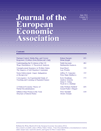
Journal of the European Economic Association
Unveiling the Dynamics of Economics for a Better TomorrowThe Journal of the European Economic Association, published by Oxford University Press, stands as a cornerstone in the field of economics, boasting a strong impact factor that reflects its high citation rates and significance among peers. With an impressive Scopus ranking of 12 out of 288 in general economics, encompassing a remarkable 96th percentile, this journal is recognized for its rigorous peer-reviewed research contributions that advance the understanding of economic theory and policy. Dedicated to publishing innovative studies and theoretical advancements since its inception in 2003, it continues to engage scholars worldwide, providing vital insights applicable to both academia and industry. Although it does not follow an open-access model, the journal's extensive reach and commitment to excellence make it an essential resource for researchers, professionals, and students seeking to deepen their understanding of contemporary economic issues. Based in the United States, the journal reflects a European perspective on global economic challenges, making it indispensable for those at the forefront of economic research.

Economics of Governance
Shaping the Future of Governance through Economic Research.Economics of Governance (ISSN: 1435-6104; E-ISSN: 1435-8131) is a distinguished journal published by SPRINGER HEIDELBERG, dedicated to advancing the field of governance economics. Established in 2003, this journal explores the intricate relationships between governance structures and economic performance, making it a vital resource for researchers, practitioners, and policymakers alike. With its impressive categorization in Q3 in Business and International Management and Q2 in Economics, Econometrics, and Finance (miscellaneous) as of 2023, it stands as a prominent platform for innovative research. Although it operates without open access, it attracts a robust readership owing to its critical analyses and high-quality contributions, fostering an understanding of governance mechanisms in a globalized economy. The journal also receives recognition within Scopus, ranking #139 in General Economics and #323 in Business and International Management, reflecting its influence in shaping current discourse and research trends. For those devoted to the economics of governance, this journal is a crucial asset that continually encourages scholarly inquiry and professional development.

Terra Economicus
Advancing Multidisciplinary Insights in Social SciencesTerra Economicus, published by Southern Federal University, stands as a significant peer-reviewed academic journal that focuses on the intricate intersections of economics, law, political science, and sociology. With an ISSN of 2073-6606, this journal has carved out a commendable reputation within the academic community, as evidenced by its placement in various category quartiles: Q3 in Economics, Econometrics and Finance, Q1 in History, and Q2 in Law, Political Science, and Sociology as of 2023. Such rankings highlight the journal’s dedication to high-quality scholarship and its impact on interconnected social sciences. The journal not only aims to bridge diverse fields of study but also addresses contemporary issues that require a multidisciplinary approach. Hailing from the Russian Federation, Terra Economicus operates with an open access model, promoting widespread dissemination of knowledge. Its commitment to covering a broad scope of topics makes it a vital resource for researchers, practitioners, and students alike, providing insights and fostering dialogue across various academic disciplines.
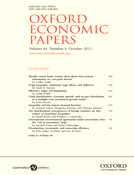
OXFORD ECONOMIC PAPERS-NEW SERIES
Advancing economic thought through rigorous research.OXFORD ECONOMIC PAPERS-NEW SERIES is a prestigious academic journal published by Oxford University Press, dedicated to advancing the field of economics and econometrics. With an ISSN of 0030-7653 and an E-ISSN of 1464-3812, this journal has a rich history since its inception in 1938, and continues to play a vital role in disseminating impactful research through its convergence of years spanning from 1938 to 2024. Recognized as a Q2 journal in the 2023 category of Economics and Econometrics, it ranks #396 among 716 in its field according to Scopus, reflecting a commendable position within the academic community, particularly in global economic discussions. While the journal currently does not offer open access options, it remains committed to providing a platform for rigorous research and critical discourse. Researchers, professionals, and students will find the journal's articles to be essential reading, offering insights that are pivotal for understanding economic trends, policies, and methodologies. Its focus on high-quality scholarship ensures that contributions are both theoretically robust and practically relevant, making it a significant resource in the ever-evolving landscape of economic research.
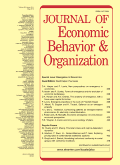
JOURNAL OF ECONOMIC BEHAVIOR & ORGANIZATION
Innovating Understanding in Organizational DynamicsJOURNAL OF ECONOMIC BEHAVIOR & ORGANIZATION, published by Elsevier, stands as a pivotal platform at the intersection of economics, organizational behavior, and human resource management. Established in 1980 and continuing its impactful contribution to scholarship, this journal holds a prestigious Q1 ranking in both its primary categories for 2023, signifying its significance in advancing research in these fields. The journal’s rigorous peer-review process ensures the publication of high-quality articles that delve into the complexities of economic decision-making and organizational dynamics. Researchers and practitioners alike benefit from its comprehensive analyses and innovative insights, making it an essential resource for those seeking to understand the intricate interplay between economic behavior and organizational structures. With its wide-reaching implications and adherence to excellence, the JOURNAL OF ECONOMIC BEHAVIOR & ORGANIZATION is poised to continue shaping the landscape of economic and organizational research through 2024 and beyond.
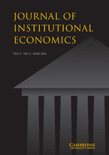
Journal of Institutional Economics
Unraveling the Impact of Institutions on Economic SystemsJournal of Institutional Economics, published by Cambridge University Press, stands as a premier forum for the dissemination of research at the intersection of economics, institutions, and governance. With an ISSN of 1744-1374 and E-ISSN 1744-1382, this journal has established itself as a vital resource within the academic community, achieving an impressive Q1 ranking in the field of Economics, Econometrics and Finance as of 2023. The journal's focus on institutional analysis not only enhances our understanding of economic phenomena but also fosters interdisciplinary dialogue among scholars and practitioners alike. With a commendable rank of 39 out of 288 in Scopus rankings, placing it in the 86th percentile, the Journal of Institutional Economics provides access to groundbreaking research that holds significant implications for policy and decision-making. Researchers, professionals, and students engaged in the study of economic systems will find this journal an invaluable addition to their academic resources.
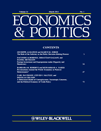
Economics & Politics
Unraveling the Dynamics of Economics in Political ContextsEconomics & Politics is a distinguished journal published by Wiley Periodicals, Inc., focusing on the dynamic intersection of economic theory and political analysis. With an ISSN of 0954-1985 and an E-ISSN of 1468-0343, this journal has established itself as a key resource since its inception in 1989, continuing to contribute to scholarly discourse through 2024. The journal is recognized for its rigorous peer-reviewed articles, achieving a commendable Q2 ranking in the field of Economics and Econometrics in 2023. Positioned within the competitive landscape of academic publishing, it ranks 374 out of 716 in Scopus within the subcategory of Economics and Econometrics, reflecting its significant 47th percentile rank. Although it does not feature an Open Access option, the journal remains accessible to researchers, professionals, and students committed to understanding the complex interplay between economic policies and political structures. As a vital platform for innovative research and scholarly debate, Economics & Politics encourages submissions of original articles that challenge conventional wisdom and offer new insights into the economic underpinnings of political strategies.